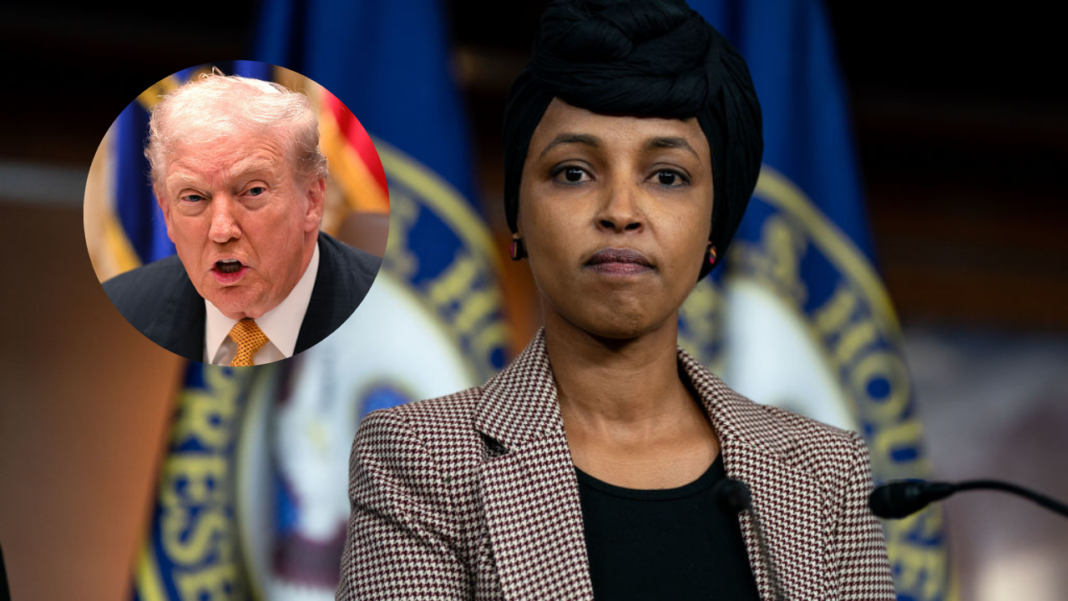Ilhan Omar and Trump: A Continued Political Clash
U.S. Representative Ilhan Omar, a Democrat from Minnesota, recently found herself in the headlines after President Donald Trump targeted her during a Fox News interview. This exchange adds another chapter to the ongoing clash between Omar, a prominent progressive voice in Congress, and Trump, whose comments often stir controversy and division.
Trump’s Critique of Democrats
During the interview with Laura Ingraham, Trump expressed his disdain for the Democratic Party, calling its members “crazed lunatics.” He then made veiled references to Omar and other progressive women of color in Congress, highlighting his belief that their backgrounds undermine their credibility in discussing American governance. Specifically, Trump alluded to Omar’s Somali heritage, stating, “I look at somebody that comes from Somalia, where they don’t have anything — they don’t have police, they don’t have military, they don’t have anything.”
These remarks echo a larger narrative Trump has often employed to paint progressive figures as out of touch with the realities of American life. By positioning Omar as a representative of a “crime-infested” locale, he attempted to diminish her authority to contribute to discussions about policy and governance.
Omar’s Response
Not one to back down, Omar swiftly rebutted Trump’s comments, emphasizing her educational background and understanding of the U.S. Constitution. In a tweet that resonated with her supporters, she quipped, “Unlike you, I can read and that’s why I know what the Constitution says.” This response not only showed Omar’s resilience but also highlighted her commitment to engage in political discourse intelligently.
Omar’s reply is significant in that it reflects a broader theme in contemporary politics: the fight for representation and acknowledgment of diverse perspectives. Her assertion that she understands the Constitution challenges Trump’s attempts to undermine her legitimacy as a lawmaker based on her origin.
The Narrative of the “Squad”
Trump’s comments about Omar are part of a larger pattern of targeting progressive women of color in Congress, often referred to collectively as “The Squad.” This group includes prominent lawmakers like Alexandria Ocasio-Cortez, Rashida Tlaib, and Ayanna Pressley. Trump’s past remarks, including his infamous suggestion that Omar and Tlaib apologize for their criticisms of the U.S. by saying, “Why don’t they go back and help fix the totally broken and crime infested places from which they came,” revealed a consistent strategy of questioning their loyalty to America.
Such inflammatory rhetoric has drawn criticism not just from Democrats but also from various civil rights advocates, who argue it is indicative of a racially charged political climate. By framing his criticisms in terms of race and nationality, Trump has often faced accusations of perpetuating xenophobia and racism.
The Political Landscape
The ongoing exchanges between Trump and Omar reflect the polarized nature of American politics today. The tactics employed by both parties continue to evolve, demonstrating how political figures must navigate complex social issues while appealing to their bases. For Omar, standing her ground against Trump serves not only to defend her own reputation but also to galvanize support from constituents who value representation and inclusivity.
Trump’s strategy of targeting individual lawmakers to vilify an entire political party has implications beyond mere rhetoric. It creates a narrative that influences public opinion and shapes the political discourse, often leading to heightened tensions across the political spectrum.
The Wider Implications
As this saga unfolds, it raises questions about the state of political discourse in the United States. Can meaningful dialogue occur when criticisms often devolve into personal attacks? The interactions between Omar and Trump exemplify the challenges of engaging in politics in an age where sound bites often overshadow substantive debate.
The heated exchanges signify a struggle not just for political power but for the soul of American democracy, where voices from diverse backgrounds seek to navigate a landscape often dominated by singular narratives. As Omar continues to face scrutiny, her responses may influence how future generations of political figures approach the art of debate and discussion in an increasingly divided society.
By addressing both the personal and political dimensions of this clash, we gain a clearer understanding of the ongoing narrative between Ilhan Omar and Donald Trump, which serves as a microcosm of larger political dynamics at play.



